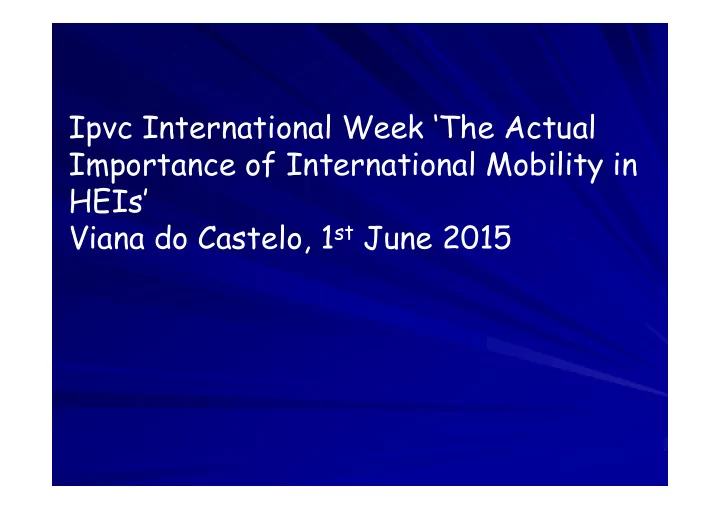

Ipvc International Week ‘The Actual Importance of International Mobility in HEIs’ Viana do Castelo, 1 st June 2015
Free movement of researchers and scientists within the European Research Area (ERA): Mobility: Rhetoric and Reality All these people may wish or may need to be MOBILE Louisa Borg Haviaras: PhD Candidate, School of Law, Oxford Brookes University
MOBILITY IS PART OF OUR LIFE Our goods Our People Cars neighbours friends electronics associates Drinks collaborators Food teachers or Films professors doctors petrol Jobs residence relationships
Mobility …resembles an Iceberg At the top there is Rhetoric At the bottom there is the Reality
Paper outline 1. How Mobility is perceived: why and where 2. Mobility as a prerequisite for an effective ERA 3. Gaps impeding Mobility 4. Concluding remarks and recommendations
Part 1: How Mobility is perceived: why, where? MOBILITY IS PART OF OUR LIFE: Why? Modern society is organized around practices which entail various forms of movement The European context : 1.The aim is to achieve an internal market of research in Europe: ERA 2. Increase the attractiveness of Europe 3 fill skilled labour positions 4. Address demographic and economic challenges The key to achieve this: the human element involved: Researchers scientists doctoral candidates are carriers of this knowledge through their mobility
Part 2 Mobility as the prerequisite for an effective ERA ERA: a unified area open to the world based on the internal market in which researchers ,scientific knowledge and technology circulate freely and through which the Union and its Member States strengthen their scientific and technological bases, competitiveness and capacity to collectively address grand challenges Commission of the European Communities 2000 , 2012
Part 2 Continues: Who needs to be mobile? Researchers: “Professionals engaged in the conception or creation of new knowledge, products, processes, methods and systems, and in the management of the projects concerned” relating to “basic, strategic and applied research, experimental development, transfer of knowledge, innovation and advisory abilities which depend on whether knowledge is targeted at being applied specifically (either in industry or for social purposes) or not” Source : Frascati Manual Proposed Standard Practice for Surveys on Research and Experimental Development, OECD, 2002 p 93 and Communication from the Commission to the Council and the European Parliament COM (2003) 436 at p6
Part 2 Continues Mobility is essential Different forms 1. Inward Mobility: attracting researchers from abroad 2. Outward Mobility: moving of researchers to other countries 3. Sectorial Mobility: mobility within the same sector (intra sectorial e.g. from one university to another : mobility between sectors (inter sectorial e.g. between academia and industry : inter- and trans- disciplinary (between and across disciplines) European Commission ‘ Researcher’s Report’ 2012
Part 2 Continues: Initiatives to facilitate researchers’ mobility : Euraxess Portals: accessing information on mobility The European Charter of Researchers (2005): role, responsibilities, rights of researchers The Code of Conduct for the recruitment of researchers in Europe (2005) European Partnership for researchers (2008): job information database Marie Curie Actions: promotion of researchers’ career and mobility Horizon 2020: the most recent EU financial programme
Part 2 Continues: Initiatives to facilitate researchers’ mobility: ERASMUS Mundus 2009-2013: Established in 2008 (Decision N° 1298/2008/EC) continues and expands as a cooperation and mobility programme in the HE field Aims: enhance quality in EU HE, joint programmes at master/doctoral levels excellence in learning around the world, partnerships between EU and Third Country HEI promotion of EU as an educational destination
Part 3 Gaps impeding mobility EU Migration Directives Member States’ national law: Mobility is caught between: e.g. affects moving from one MS to The European Free movement another for those The Area of Freedom Security and enrolled in joint Justice programmes and are The ERA is an incomplete project studying in 2 different countries (Erasmus Mundus students) Reality ERA fragmented and incomplete
Part 3 Continues Brain drain = Unbalanced growth Uneven labour distribution Fears , gender issues Brain waste Prejudice, = discrimination Misallocation, Brain drain under- brain waste utilization of lack of information resources
Part 3 Continues Lack of portability throughout Europe of publicly funded grants Lack of open transparent recruitment procedures Social security and pension rights Lack of recognition of diplomas awarded by MSs in other countries Reality National reforms to deliver ERA based on a voluntary basis
Part 4 Recommendations Binding targets for Member States in relation to research investment Single centre to coordinate research and technological development policy Implementation of a set of appropriate measures to facilitate mobility Stronger political commitment Real implementation of the Charter and Code - monitoring? A European Research Area Directive?
Part 4 Continues: Concluding Remarks What kind of Mobility? One that Keeps people Happy Secure Productive Informed Satisfied
The End Thank you for Thank you for Thank you for Thank you for listening listening! listening listening
Recommend
More recommend